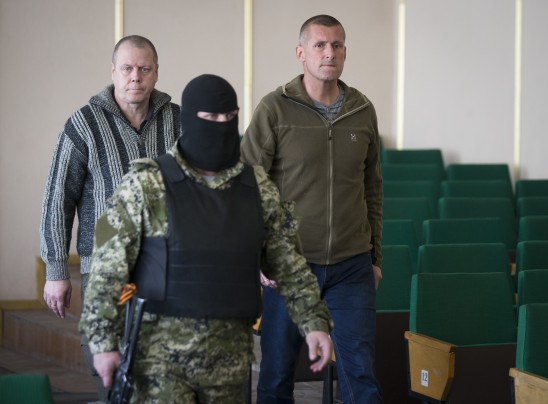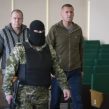
Hostages for Trading: An Innovation of Putin’s Kremlin in Ukraine
Publication: Eurasia Daily Monitor Volume: 11 Issue: 84
By:

On May 3, Russia’s proxy forces in Ukraine’s city of Slovyansk released from captivity the military observers of the Organization for Security and Cooperation in Europe (OSCE). The German-led group of eight unarmed officers (four Germans and one each from Sweden, Denmark, Poland and the Czech Republic) had been held hostage since April 25 in Slovyansk (ITAR-TASS, May 3).
This case may well be the first recorded instance of Russia’s top leaders directly using hostages as bargaining chips for diplomatic trade-offs. During that ordeal, the German government and the OSCE were asking Russia to intercede for the observers’ release. Moscow repeatedly offered to arrange the observers’ conditional release, in return for Western political concessions to Russia in the Russia-Ukraine conflict.
According to the German government’s analysis, the observers’ abduction was a highly professional intelligence operation, before the group was handed over to the local paramilitary rebels (Frankfurter Allgemeine Zeitung, May 6). This seems to imply that Russian intelligence operatives abducted the OSCE observers, whereupon the Slovyansk command took them into custody so as to exempt Moscow from direct responsibility.
While officially disclaiming any control over its armed proxies, Moscow, in fact, confirmed its control by offering to have the hostages freed conditionally. Germany, which led the negotiations, refused any direct trade-off. At that point, the Kremlin again confirmed its control by simply instructing the Russian field commander in Slovyansk, Colonel Igor Strelkov/Girkin, to release the OSCE observers.
Russian President Vladimir Putin and Foreign Affairs Minister Sergei Lavrov publicly asked Germany and the OSCE to acknowledge the authority of Moscow’s proxies in the “Donetsk People’s Republic.” Putin and Lavrov set their conditions, as did the Slovyansk rebel command. The Kremlin’s and Russian Foreign Affairs Ministry’s press releases expose those demands.
The first condition was a quasi-recognition of the secessionist leaders’ authority de facto. According to Putin, “in entering a territory that does not recognize Kyiv’s authority, the observers should have reached agreement with those people who are in control of the situation in those territories. The [observers] did not do this, and therefore ended up in the situation that we see. They [OSCE] should draw the appropriate conclusions and make sure to avoid such mistakes in the future” (kremlin.ru, April 30). Similarly, according to Lavrov, those observers were wrong to enter the area “without proper notification to the public structures that control the situation there”; the OSCE should have requested agreement from the “people’s self-defense forces” there (Interfax, April 26, 30; RIA Novosti, April 27). That way, international organizations—the OSCE for starters—would de facto have acknowledged the authority of Russia’s proxies in territories they have seized.
The second condition was an exchange of the OSCE’s abducted observers for the secessionist militants detained by Ukraine’s authorities in early April, prior to Kyiv’s loss of control in the Donetsk region. Commenting on the hostage situation in Slovyansk, Putin suggested, “Kyiv’s authorities should release from detention the people in whom the [Donetsk] population has placed its trust, and should talk directly with them” (kremlin.ru, April 30). When Swiss President Didier Burkhalter, the current holder of the OSCE’s chairmanship, called on Lavrov to intercede with the hostage takers, Lavrov “drew attention to [Donetsk] community leaders detained in Kyiv for political reasons.” Lavrov asked Burkhalter to obtain access to them and demand their release. The main figure among them is “Donetsk people’s governor” Pavel Gubarev [Pavlo Hubaryov], who led the early, abortive assaults on administrative buildings in Donetsk (RIA Novosti, April 2; Interfax, April 26, 30).
The third condition was for Ukraine to withdraw its military units from areas that Moscow wants to be defined as contested areas. When Germany’s Chancellor Angela Merkel called on Putin to help release the German-led OSCE group, Putin replied that Ukrainian troops should be removed from Ukraine’s “eastern and southern regions [sic]” (Interfax, May 1). Merkel further asked Putin to let Ukraine’s presidential election be held on May 25 in Donbas. In the same context, Russia’s Foreign Affairs Ministry warned Ukraine not to move against “community defense volunteer units composed of local citizens” there (Interfax, April 29).
The armed secessionists in Slovyansk and elsewhere in Donbas had issued those same demands in their own name. Moscow spoke in unison with them. The Kremlin put its weight behind the Slovyansk command in seeking to trade hostages for political concessions.
The crowning demand was for Kyiv to “enter into dialogue with representatives of [Ukraine’s] east and south,” and the OSCE to mediate between these “parties to the conflict at the negotiating table” (implying the two parties’ equivalence). Putin and Lavrov both used that formulation or slight variations on it. They invoked the April 17 Geneva Statement as a basis for appointing the OSCE to mediate between “the sides,” in what Moscow depicts as a conflict within Ukraine, instead of a Russia-Ukraine conflict (kremlin.ru, April 30; Interfax, April 29, 30, May 1; see EDM, April 30, May 11).
That demand remains at the top of Moscow’s agenda for the upcoming Geneva Two meeting. The OSCE helps Russia to accredit that mischaracterization of this conflict, de facto equating Russia’s proxies with Ukraine’s government in negotiations, and potentially encouraging Ukraine’s “federalization” This is not a quid-pro-quo for Moscow ordering the release of OSCE observers. This organization had shown itself ready to endorse Russia’s definition of the conflict, at Ukraine’s expense, well before the hostage crisis.
Ultimately, it was Germany who refused a direct trade-off, and the Kremlin who arranged the hostages’ release by telephone with the captors. Putin’s “special envoy for human rights,” Vladimir Lukin, and his office made several telephone calls to Colonel Strelkov/Girkin in Slovyansk. The Ukrainian authorities have posted the audio recordings of three calls, made on May 1 and 2, on YouTube (https://www.youtube.com/watch?v=fXZuHUyWQuw). These conversations make clear that the Russian field commander had already received orders from his own superiors in Moscow (whom he does not identify) to release the OSCE observers on May 3. Lukin merely arranged some logistical and public relations aspects of the release with Strelkov/Girkin. The release at the snap of the Kremlin’s fingers (and reversing the previous stance) confirms that Russia controls the rebel command, notwithstanding Russian diplomacy’s continuing denials of that fact.




